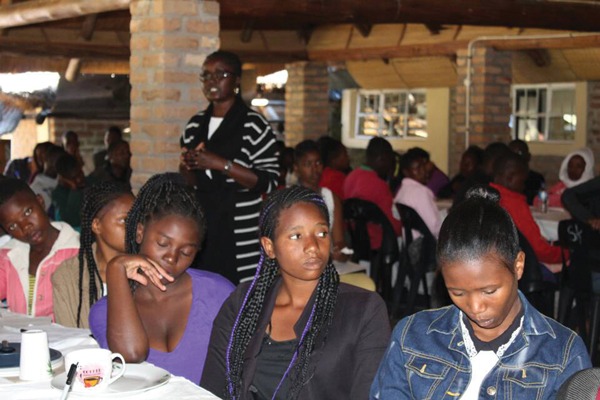
A young, Portia Makore (not real name) has mastered raunchy dance moves to attract male clients at a popular bar in Marondera.
BY JAIROS SAUNYAMA
Although the visibly drunk girl is one of the teenagers that are sexually exploited to earn a living, it is her background story that is chilling. The 14-year-old narrated how she fled her rural home to the urban area after her parents had serial fights.
“I fled home because I could not bear to see my parents fighting every day. The fights were so intense and frequent, and there was no peace. I could not sit back and watch my mother bleeding everyday and had to leave home.
I went to Mutare and lived with my aunt, but it wasn’t rosy. I then joined other girls on the streets and that is how it all started,” she said.
Gender-based Violence (GBV) is increasing and has snared children, who in turn flee from their homes in search of peace. However, life becomes hard for many particularly the young girls, who indulge in immoral activities for survival.
Speaking on the sidelines of the annual children’s conference held at Karimazondo Campsite, outside Marondera, Tatenda Sabumba of Midlands Aid Services Organisation (Maso) said GBV was a major cause of child sexual abuse, as it drove young people, especially girls, away from their homes.
“Children get emotional each time their parents fight and if this continues, they leave their homes. The problem is their destination, most of them, especially the girl child, end up being exploited sexually as a means of survival,” he said.
- Chamisa under fire over US$120K donation
- Mavhunga puts DeMbare into Chibuku quarterfinals
- Pension funds bet on Cabora Bassa oilfields
- Councils defy govt fire tender directive
Keep Reading
The children’s conference was supported by Voluntary Services Overseas (VSO) through funding from Comic Relief under the amplifying the voices of people affected by HIV project being implemented by the Zimbabwe National Welfare for the Council of Children (ZNCWC).
According to Unicef, examples of GBV affecting women and girls include but are not limited to sex, selective abortion, differential access to food and services, sexual exploitation and abuse, child marriage, female genital mutilation, sexual harassment, bride price abuse, honour killings, domestic or intimate partner violence, deprivation of inheritance or property, and elder abuse.
ZNCWC programmes manager, Maxim Murungweni, who organised the conference, said the disintegration of the family unit resulted in children failing to get guidance on life issues.
“In a national research conducted by our organisation in 2016, GBV was cited as one of the push factors that has forced children to engage in sexual exploitation. Children noted that conflict within families, especially between their parents, has created unconducive environments to live under. As such, the children ended up running away from home, which made them vulnerable.
“This has been worsened by the disintegration of the family unit, which has seen children not getting the necessary adult guidance. It is, therefore, important for our social safety nets and case management systems to address the needs of such children living in family environments that are often characterised by GBV,” he said.
Murungweni said that there was need to acknowledge the negative psychosocial impact that GBV had on children and put in place rehabilitation services for such children.
Gender-based violence includes domestic abuse, rape and sexual assault, childhood sexual abuse, sexual exploitation, stalking and harassment, and harmful traditional practices. It predominantly affects women, although men too can be victims of abuse.
Domestic abuse may be physical, sexual, verbal or psychological, involve financial constraints and coercions or a combination of any of these.
Regional Network of the Children and Young People Trust (RNCYPT) programmes officer, Joseph Kauzani, who facilitated at the children’s conference, said the harsh economic conditions are fueling the rise in GBV cases, thereby, negatively affecting children as far as sexual exploitation was concerned.
“With the economic challenges being faced by many families in the country, there are increasing cases of domestic violence due to insufficient resources.
GBV is frequently used as an instrument of conflict and many girls end up escaping their homes in search of peaceful environment and end up in the streets,” he said.
“In an effort to search for a non-violent environment and green pastures the young girls end up being sexually exploited because they need to attain sufficient resources.
Living in a home, where there is peace, is every child’s right, hence, the society of Zimbabwe must do away with GBV as it making girls prone to sexual exploitation,” he said.
According to statistics by the Zimbabwe Republic Police, more than 100 girls are sexually abused every day in Zimbabwe.
The ZNCWC 2016 research indicated poverty as the major push factor forcing children to be sexually exploited.
A 2014 study entitled Child Poverty in Zimbabwe: Deprivations and Inequities in Child Wellbeing found that 65% of children experienced severe child poverty (at least one deprivation), while 42% experienced child absolute poverty (at least two deprivations).











